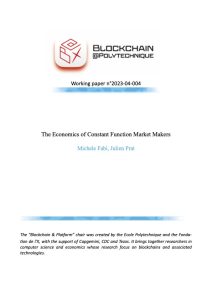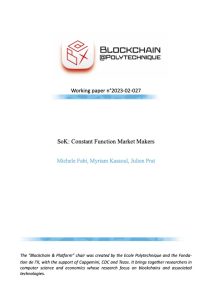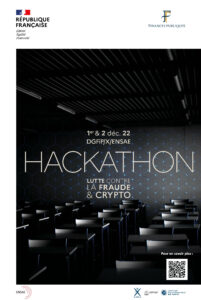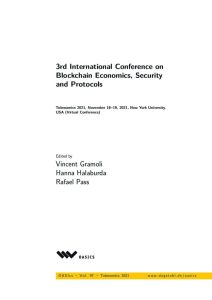
CBER SUMMER SCHOOL
Where Columbia University, New-York Dates 05/09/2025 – 06/09/2025 CBER SUMMER SCHOOL Chair event The Crypto and Blockchain Economics Research (CBER) Forum invite

Where Columbia University, New-York Dates 05/09/2025 – 06/09/2025 CBER SUMMER SCHOOL Chair event The Crypto and Blockchain Economics Research (CBER) Forum invite

A two-day workshop where academics, central bankers and industry experts will envision the future(s) of money.
We study financial contagion in Compound V2, a decentralized lending protocol deployed on the Ethereum blockchain. We explain how to construct the balance sheets of Compound’s liquidity pools and use our methodology to characterize the financial network. Our analysis reveals that most users either borrow stablecoins or engage in liquidity mining. We then study the robustness of Compound through a series of stress tests, identifying the pools that are most likely to set off a cascade of defaults.

We use microeconomic theory to describe the inner workings of Constant Function Market Makers (CFMMs). We show that standard results from consumer theory apply in this new context, endowing us with powerful tools to characterize the optimal design of CFMMs. We employ them to analyze the externalities that traders and liquidity providers exert on each other when interacting through a CFMM. Liquidity providers reduce the execution costs by flattening the bonding curve on which trades are executed. Arbitrageurs impose an adverse selection cost on liquidity providers by unfavorably rebalancing their portfolio. We show that the strengths of these two externalities are pinned down by the curvature of the bonding curve and are inversely related to each other, thereby identifying the fundamental economic tradeoff that market designers have to address.

We provide an overview of the academic literature on Automated Market Makers for Decentralized Exchanges. Our review puts an emphasis on contributions from researchers in economics and finance. We cover papers that study the optimal design of Automated Market Makers. Then we discuss models that leverage the insights from the literature on two-sided markets to characterize the equilibrium size of liquidity pools and the incentives of liquidity providers. Finally, we review recent research on the interactions between Miner Extractible Value and Decentralized Exchanges.

Tokenomics, International Conference on Blockchain Economics, Security and Protocols is an international forum for theory, design, analysis, implementation and applications of blockchains and smart contracts. Original interdisciplinary works exploring the conjunction of economic concerns with distributed systems, networks and system security are particularly encouraged.

Hackathon organisé par la direction générale des Finances publiques (DGFiP), le Département d’Economie de l’Ecole Polytechnique, l’ENSAE et La Chaire Blockchain@Polytechnique sur le thème de la lutte contre la fraude fiscale sur les activités crypto.
Les 1er et 2 décembre…

Tokenomics is an international forum for theory, design, analysis, implementation and applications of blockchains and smart contracts. The goal of the conference is to bring together economists, computer science researchers and practitioners working on blockchains in a unique program featuring outstanding invited talks and academic presentations.

Hanna Halaburda (New York University) Presenting “An Economic Model of Consensus on Distributed Ledgers“ Discussant: Cyril Monnet (University of Bern) Moderator: Thomas Moser (Swiss National…

This October HEC MBA Blockchain Club and Blockchain@X (Ecole Polytechnique) will collaborate for the first time to host a Web 3.0. TEZOS HACKATHON. During a…